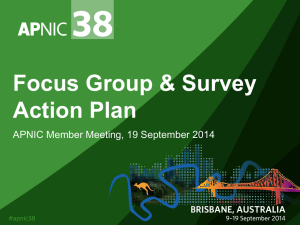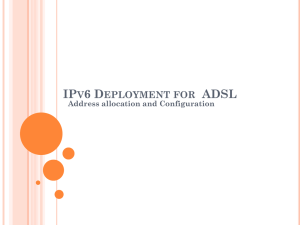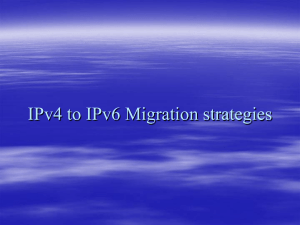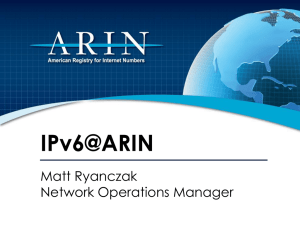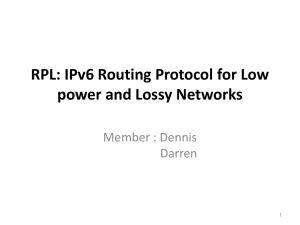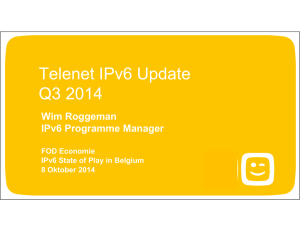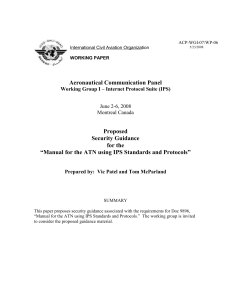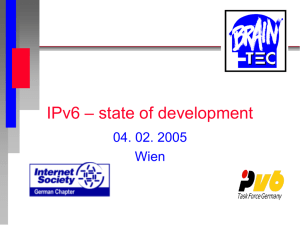Draft - ATN IPv6 Node Security Requirements
advertisement
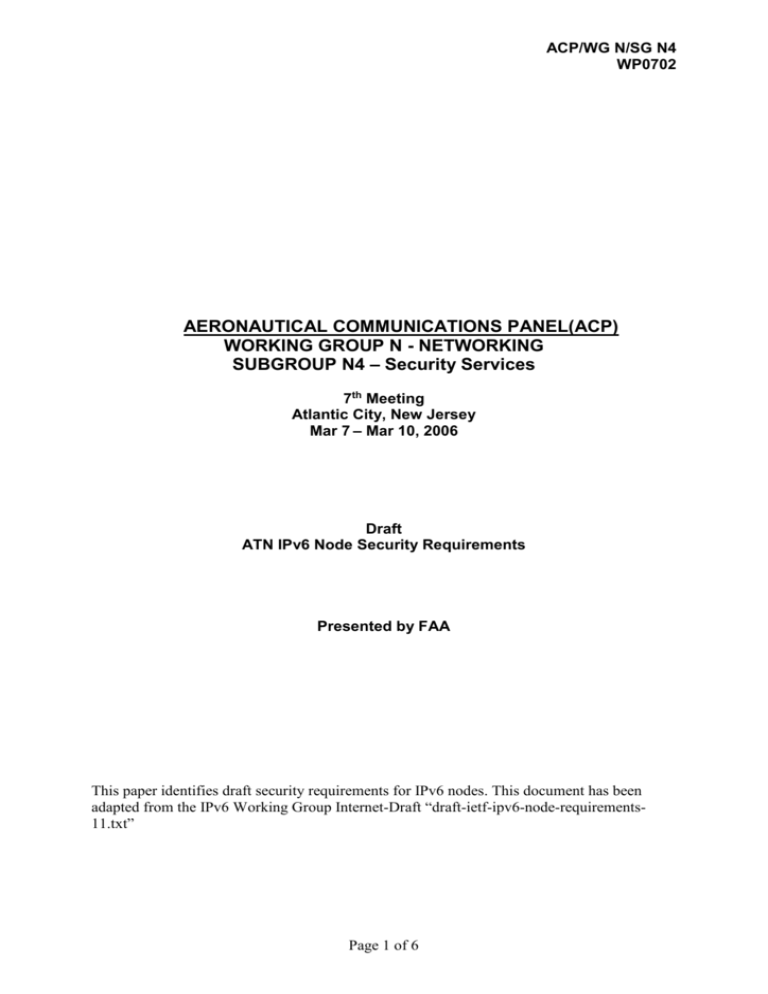
ACP/WG N/SG N4 WP0702 AERONAUTICAL COMMUNICATIONS PANEL(ACP) WORKING GROUP N - NETWORKING SUBGROUP N4 – Security Services 7th Meeting Atlantic City, New Jersey Mar 7 – Mar 10, 2006 Draft ATN IPv6 Node Security Requirements Presented by FAA This paper identifies draft security requirements for IPv6 nodes. This document has been adapted from the IPv6 Working Group Internet-Draft “draft-ietf-ipv6-node-requirements11.txt” Page 1 of 6 ACP/WG N/SG N4 WP0702 ATN IPv6 Node Security Requirements This document has been adapted from the IPv6 Working Group Internet-Draft “draft-ietfipv6-node-requirements-11.txt” 1. Introduction The goal of this document is to define the minimal security functionality required from both IPv6 hosts and routers. 2. Definitions The following definitions are from Internet Protocol, Version 6 (IPv6) Specification [RFC2460]: IPv6 Node - a device that implements IPv6 IPv6 router - a node that forwards IPv6 packets not explicitly addressed to itself. IPv6 Host - any node that is not a router. 3. Mobile IP Security Hosts shall support secure home agent communications [MIPv6-HASEC]. Routers shall support [MIPv6-HASEC]. Note. – Requirement assumes that MIPv6 is the selected mobility solution. 4. IPsec Security 4.1 Basic Architecture IPv6 nodes shall support the Security Architecture for the Internet Protocol [RFC-2401]. Note. - RFC-2401 is being updated by the IPsec Working Group. 4.2 Security Protocols IPv6 nodes shall support ESP [RFC-2406]. IPv6 nodes shall support AH [RFC-2402]. Note. - RFC-2406 and RFC 2402 are being updated by the IPsec Working Group. 4.3 Transforms and Algorithms IPv6 nodes shall conform to the requirements in "Cryptographic Algorithm Implementation Requirements For ESP And AH" [CRYPTREQ]. Page 2 of 6 ACP/WG N/SG N4 WP0702 Note. - Current IPsec RFCs specify the support of transforms and algorithms for use with AH and ESP: NULL encryption, DES-CBC, HMAC-SHA-1-96, and HMAC-MD5-96. However, [CRYPTREQ] contains the current set of mandatory to implement algorithms for ESP and AH. It also specifies algorithms that should be implemented because they are likely to be promoted to mandatory at some future time. IPv6 nodes shall support the NULL encryption algorithm [RFC-2410] and the NULL authentication algorithm [RFC-2406]; however, they shall not both be null. Note. - Since ESP encryption and authentication are both optional, support for the NULL encryption algorithm [RFC-2410] and the NULL authentication algorithm [RFC-2406] is to be provided to maintain consistency with the way these services are negotiated. However, while authentication and encryption can each be NULL, they should not both be NULL. IPv6 nodes shall support the 3DES-CBC encryption algorithm [RFC-2451] and the AES-128CBC algorithm [RFC-3602]. Note. - The DES-CBC encryption algorithm [RFC-2405] should not be supportedwithin ESP. Security issues related to the use of DES are discussed in [DESDIFF], [DESINT], [DESCRACK]. DES-CBC is still listed as required by the existing IPsec RFCs, but updates to these RFCs will be published soon. DES provides 56 bits of protection, which is no longer considered sufficient. IPv6 nodes shall support the use of HMAC-SHA-1-96 algorithm [RFC-2404] within AH and ESP. IKE???? 4.4 Key Management Methods IPv6 nodes shall support manual configuration of the security key and SPI. Note. - The SPI configuration is needed in order to delineate between multiple keys. IPv6 nodes shall support the IKEv1 [RFC-2407] [RFC-2408] [RFC-2409] and IKEv2 [IKEv2] key management systems Note. - Where key refresh, anti-replay features of AH and ESP, or on-demand creation of Security Associations (SAs) is required, automated keying shall be supported by IPv6 nodes. 5. References 5.1 Normative [CRYPTREQ] D. Eastlake 3rd, "Cryptographic Algorithm Implementation Requirements For ESP And AH", draft-ietf-ipsecesp-ah-algorithms-01.txt, January 2004. Page 3 of 6 ACP/WG N/SG N4 WP0702 [IKEv2ALGO] J. Schiller, "Cryptographic Algorithms for use in the Internet Key Exchange Version 2", draft-ietf-ipsecikev2-algorithms-05.txt, Work in Progress. [MIPv6-HASEC] J. Arkko, V. Devarapalli and F. Dupont, "Using IPsec to Protect Mobile IPv6 Signaling between Mobile Nodes and Home Agents", draft-ietf-mobileip-mipv6-haipsec-06.txt, Work in Progress. [RFC-2104] Krawczyk, K., Bellare, M., and Canetti, R., "HMAC: Keyed-Hashing for Message Authentication", RFC 2104, February 1997. [RFC-2401] Kent, S. and Atkinson, R., "Security Architecture for the Internet Protocol", RFC 2401, November 1998. [RFC-2402] Kent, S. and Atkinson, R., "IP Authentication Header", RFC 2402, November 1998. [RFC-2403] Madson, C., and Glenn, R., "The Use of HMAC-MD5 within ESP and AH", RFC 2403, November 1998. [RFC-2404] Madson, C., and Glenn, R., "The Use of HMAC-SHA-1 within ESP and AH", RFC 2404, November 1998. [RFC-2405] Madson, C. and Doraswamy, N., "The ESP DES-CBC Cipher Algorithm With Explicit IV", RFC 2405, November 1998. [RFC-2406] Kent, S. and Atkinson, R., "IP Encapsulating Security Protocol (ESP)", RFC 2406, November 1998. [RFC-2407] Piper, D., "The Internet IP Security Domain of Interpretation for ISAKMP", RFC 2407, November 1998. [RFC-2408] Maughan, D., Schertler, M., Schneider, M., and Turner, J., "Internet Security Association and Key Management Protocol (ISAKMP)", RFC 2408, November 1998. [RFC-2409] Harkins, D., and Carrel, D., "The Internet Key Exchange (IKE)", RFC 2409, November 1998. [RFC-2410] Glenn, R. and Kent, S., "The NULL Encryption Algorithm and Its Use With IPsec", RFC 2410, November 1998. Page 4 of 6 ACP/WG N/SG N4 WP0702 [RFC-2451] Pereira, R. and Adams, R., "The ESP CBC-Mode Cipher Algorithms", RFC 2451, November 1998. [RFC-2460] Deering, S. and Hinden, R., "Internet Protocol, Version 6 (IPv6) Specification", RFC 2460, December 1998. [RFC-3602] S. Frankel, "The AES-CBC Cipher Algorithm and Its Use with IPsec", RFC 3602, September 2003. 5.2 Non-Normative [DESDIFF] Biham, E., Shamir, A., "Differential Cryptanalysis of DES-like cryptosystems", Journal of Cryptology Vol 4, Jan 1991. [DESCRACK] 2000. Cracking DES, O'Reilly & Associates, Sebastapol, CA [DESINT] Bellovin, S., "An Issue With DES-CBC When Used Without Strong Integrity", Proceedings of the 32nd IETF, Danvers, MA, April 1995. [DNSSEC-INTRO] Arends, R., Austein, R., Larson, M., Massey, D. and Rose, S., "DNS Security Introduction and Requirements" draft-ietf-dnsext-dnssec-intro-10.txt, Work in Progress. [DNSSEC-REC] Arends, R., Austein, R., Larson, M., Massey, D. and Rose, S., "Resource Records for the DNS Security Extensions", draft-ietf-dnsext-dnssec-records-08.txt, Work in Progress. [DNSSEC-PROT] Arends, R., Austein, R., Larson, M., Massey, D. and Rose, S., "Protocol Modifications for the DNS Security Extensions", draft-ietf-dnsext-dnssec-protocol-06.txt, Work in Progress. [IKE2] Kaufman, C. (ed), "Internet Key Exchange (IKEv2) Protocol", draft-ietf-ipsec-ikev2-13.txt, Work in Progress. [IPv6-RH] P. Savola, "Security of IPv6 Routing Header and Home Address Options", draft-savola-ipv6-rh-ha-security03.txt, Work in Progress. [MC-THREAT] Ballardie A. and Crowcroft, J.; Multicast-Specific Security Threats and Counter-Measures; In Proceedings "Symposium on Network and Distributed System Security", February 1995, pp.2-16. Page 5 of 6 ACP/WG N/SG N4 WP0702 Page 6 of 6
